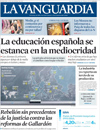
It is well established that Asian schools get better results than their European counterparts. Now, however, data from two surveys, PIRLS 2011 and TIMSS 2011, published by the International Association for the Evaluation of Educational Achievement (IEA) on December 11, indicate that the gap between the two continents is widening. TIMSS evaluated the mathematical ability of 600,000 eight-year-olds in 63 countries, while PIRLS examined the reading skills of 300,000 nine and ten-year-olds in 49 countries. The TIMSS ranking is dominated by schoolchildren in Singapore, South Korea and Hong Kong. In the PIRLS ranking, the top three places are occupied by Hong Kong, the Russian Federation and Finland. In their commentary on the results, newspapers in several countries voiced their disappointment.
Remarking on the poor performance of Spanish students, who scored below the EU average, La Vanguardia leads with a headline on “stagnation and mediocrity” in Spanish education. The Catalan daily goes on to point out that what is “most worrying” is that the results show “stagnation, or even decline in the skills of our schoolchildren.”
In the Netherlands, NRC Handelsblad notes —
Over the last four years, the slide in Dutch students’ scores in languages and mathematics has abated. The fact that the Netherlands slipped in the rankings was due to the improved results posted by other countries. The survey showed that among all of the countries, the Netherlands has the best record of helping students with learning difficulties to acquire adequate skills. The downside is that the Netherlands has hardly any top performing students.
In its commentary, the Dutch newspaper takes issue with the “dominant trend for elitism” that disregards the fact that “poor students obtain relatively good results while [noting that] those of the best students are proportionally bad.”
The issue of elitism also features in German schools, with Tageszeitung criticising the country’s education system for not being a “shining example of fairness”. The left-wing daily goes on to point out that —
Children from deprived families are less likely to attend schools that prepare them for university than the children of parents who have completed higher studies. In recent years, children from backgrounds that are supposedly ‘distant’ from ‘education’ have had to contend with obstacles that are increasingly difficult to overcome. They are required to do much better than their classmates from the cultivated bourgeoisie to convince their teachers that they are capable of meeting the challenge of university.
Was this article useful? If so we are delighted!
It is freely available because we believe that the right to free and independent information is essential for democracy. But this right is not guaranteed forever, and independence comes at a cost. We need your support in order to continue publishing independent, multilingual news for all Europeans.
Discover our subscription offers and their exclusive benefits and become a member of our community now!











